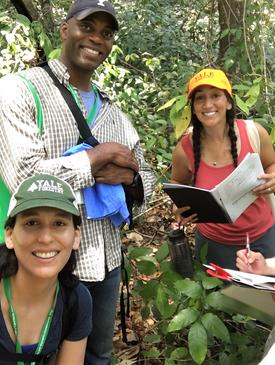Field Course in Political Ecology of Conservation and Restoration of Tropical Forest Landscapes
Summary
The tropical dry forest, the most endangered ecosystem in the Neotropics, is extremely threatened by the dominance of extensive conventional cattle ranching in Panama’s Azuero Peninsula. The destruction of forests has degraded the provision of ecosystem services, which are necessary to support local endemic wildlife and agrarian livelihoods. With an erratic annual rainfall and a dry season lasting from five to six months, the region’s extreme climate variations compound the stresses of unsustainable land-use practices and make efforts to restore the ecosystem particularly challenging. Advances in forest restoration and sustainable ranching have been shown to enhance production and ecosystem services in cattle ranching landscapes. Nevertheless, successful implementation of restoration activities in mosaic landscapes requires a clear understanding of not only biophysical approaches but also the socio-economic variables and how they influence land use decision making.
Over a period of six days, students will learn from ELTI team members and local landholders about the ecology of tropical dry forests, how and why these ecosystems have been modified over time and the distinct historical, cultural and socio-economic factors that shape and influence land management practices in the region. Students will also visit a network of field sites that showcase a range of forest restoration and sustainable cattle ranching strategies that landholders are adopting in the region with support from ELTI’s training and leadership programs. Particular attention will be given to the social aspects of conserving and restoring this unique forest type and how and why landowners and community associations facilitate and promote restoration activities on-farm. The course will take place almost entirely in the field, where students will have ample opportunity to talk with farmers and cattle ranchers about their land management challenges and opportunities and also with ELTI team members about their capacity development strategies and interventions. Students will also interact with government officials who are implementing Panama’s 1-million-hectare Bonn Challenge pledge, much of which will be implemented within complex tropical mosaic landscapes such as the Azuero Peninsula.
This field course will be facilitated at ELTI’s Azuero training landscapes in the Province of Los Santos, Panama, which convey ecological principles through its interpretative trail network and demonstration sites. In addition, participants have the opportunity interact with land-owners during visits to their model farms and learn firsthand about their motives for land management decisions.
Content
Students will participate in the following activities: attend lectures, visit research sites, demonstration areas and model farms, conduct field exercises and forest measurements, analyze and present data and interact with local landowners.
- Day 1: Orientation to Panama (Panama City)
- Day 2: ELTI capacity building model and training sites (Los Santos Province)
- Day 3: Dry tropical forest ecology and degradation
- Day 4: Range of restoration strategies
- Day 5: The role of local landowners in forest restoration efforts
- Day 6: The role of community organizations to scale-up forest restoration


